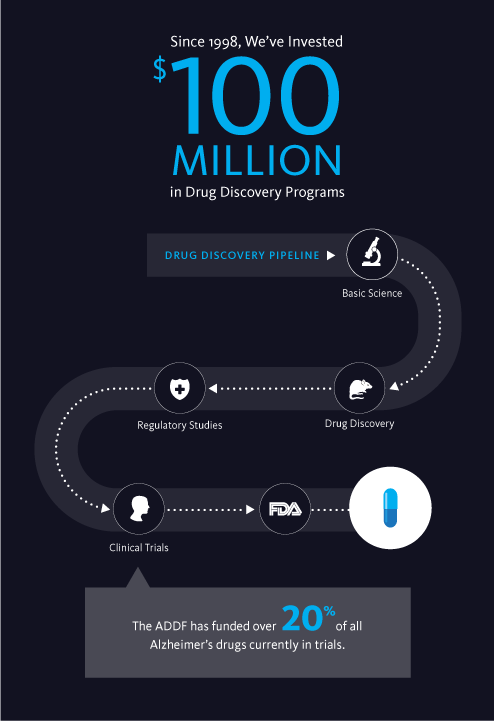
On World Alzheimer’s Day, we celebrate the progress made and look toward the future. When we founded the Alzheimer’s Drug Discovery Foundation (ADDF) 18 years ago, we had a simple guiding principle that we still follow today. Translate everything we know about the causes of Alzheimer’s disease into drugs to prevent and treat it. And what we know is that aging is the leading risk factor for Alzheimer’s.
As we age, a cascade of biological processes happen that affects our neurons and synapses, leading to Alzheimer’s disease and other dementias. These include inflammation, oxidation, vascular issues, epigenetic changes, mitochondrial dysfunction, and protein misfolding. Each one of these processes is a target for potential treatments for Alzheimer’s disease.
Most of the Alzheimer’s drugs being developed by the pharmaceutical industry have focused on plaques and tangles, which are created by the aggregation of misfolded proteins. While we are hopeful that some of these drugs will work, we believe that conquering Alzheimer’s disease will require a comprehensive approach.
The ADDF funds drugs that target all the processes that contribute to Alzheimer’s disease. We take shots from every angle to increase our odds of finding effective treatments. This approach is working. Since 1998, the ADDF has invested nearly $100 million dollars in drug discovery and development for Alzheimer’s disease. We began by funding high-risk, early-stage drug programs. When the programs showed positive results, we helped them advance and develop. Today, nearly half of our support goes to drug programs in clinical trials, the final stages of development.
Earlier this month, at our 17th International Conference on Alzheimer’s Drug Discovery, many of the researchers working on these late-stage drug programs came together to share their progress. One of the first presenters was Ihab Hajjar, PhD, from Emory University School of Medicine. Dr. Hajjar and his colleagues are conducting a clinical trial of candesartan, a drug approved for hypertension that has shown promise for targeting inflammation and vascular issues in patients with Alzheimer’s. At the conference, we announced our 2016 Goodes Prize winner, D. Martin Watterson, PhD, of Northwestern University. Dr. Watterson is developing several treatments for Alzheimer’s, including MW 189, an innovative clinical stage drug targeting neuroinflammation. Dirk Beher, PhD, from Asceneuron in Switzerland presented the drug he’s developing, ASN-561. It works to keep tau proteins from aggregating, so tangles never form. Tau tangles are a hallmark of many diseases, including frontotemporal dementia, progressive supranuclear palsy, and Alzheimer’s, and this exciting drug may be able to treat them all. The final presenter of the conference was Atticus Hainsworth, PhD, of St. George’s University of London. Dr. Hainsworth is conducting a phase 2 clinical trial of tadalafil, a drug approved for erectile dysfunction, which may be effective in treating vascular dementia and vascular cognitive impairment (VCI). There are currently no drugs approved to treat vascular dementia.
The ADDF is proud to have funded over 20 percent of all the drugs for Alzheimer’s currently in trials. And we aren’t stopping. This year, we are on track to invest more money in more drug programs than ever before. With your support, we will conquer Alzheimer’s disease.
